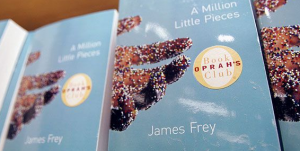Gal Beckerman and Tina Jordan from the New York Times have collected some of the best book frauds from the last 100 years:
![AUTOBIOGRAPHY OF HOWARD HUGHES: Confessions of an Unhappy Billionaire by [Irving, Clifford]](https://images-na.ssl-images-amazon.com/images/I/51dnqaxAdpL.jpg) AUTOBIOGRAPHY OF HOWARD HUGHES: Confessions of an Unhappy Billionaire
AUTOBIOGRAPHY OF HOWARD HUGHES: Confessions of an Unhappy Billionaire
by Clifford Irving
Kindle price: $2.99
The hoax:
Irving perpetrated one of the greatest literary frauds of the 20th century, though now largely forgotten: He fabricated, seemingly out of whole cloth, an authorized autobiography for the reclusive and eccentric billionaire Howard Hughes. Irving managed to fool his publisher and curious journalists, producing fake letters and calling editors from exotic places (where he was supposedly interviewing Hughes). As publication neared, he was finally caught when Hughes himself said he had no idea who Irving was. The episode landed the writer in jail after he pleaded guilty to conspiracy. In 2012, the autobiography was published for the first time as an e-book. Later in life, Irving expressed befuddlement for why it had all gotten so out of hand. “I had never realized I was committing a crime,” he said. “I had thought of it as a hoax.”
by James Frey
Kindle price: $9.99
The hoax:
For fictionalizing his memoir — including making up a three-month stint in prison and a harrowing anesthesia-free root canal — Frey landed on Oprah’s couch in early 2006. She had picked “A Million Little Pieces” for her popular book club and wanted some answers after the Smoking Gun website, in prosecutorial fashion, had revealed just how much of Frey’s addiction story had been made up. Frey appeared contrite and hangdog, admitting that he had embellished his own story. “It is difficult for me to talk to you because I feel really duped,” Oprah said. “But more importantly, I feel that you betrayed millions of readers.” Though he is forever attached to the memory of this comeuppance, Frey went on to write more books. Even Oprah eventually apologized for being so hard on him.
by Penelope Ashe
Kindle price: $9.99
The hoax:
In the late 1960s, with books by Harold Robbins and Jacqueline Susann topping the best-seller list, the Newsday columnist Mike McGrady decided that any novel with enough explicit sex in it could sell. He rallied two dozen of his fellow male journalists at the paper to write a hoax novel satirizing the genre. The group used the made-up name “Penelope Ashe” (McGrady’s sister played the role of Ashe for meetings with publishers). McGrady was right: The book sold 20,000 copies when it was first published in early 1969. Then McGrady and his crew went on the David Frost Show to reveal themselves. After being introduced as “Penelope Ashe,” they walked into the stage one by one as the house band played the song “A Pretty Girl Is Like a Melody.”
Read full post in The New York Times


![A Million Little Pieces by [Frey, James]](https://images-na.ssl-images-amazon.com/images/I/41nHlDHccmL.jpg)
![Naked Came the Stranger by [Ashe, Penelope, McGrady, Mike]](https://images-na.ssl-images-amazon.com/images/I/51vRckLLBkL.jpg)